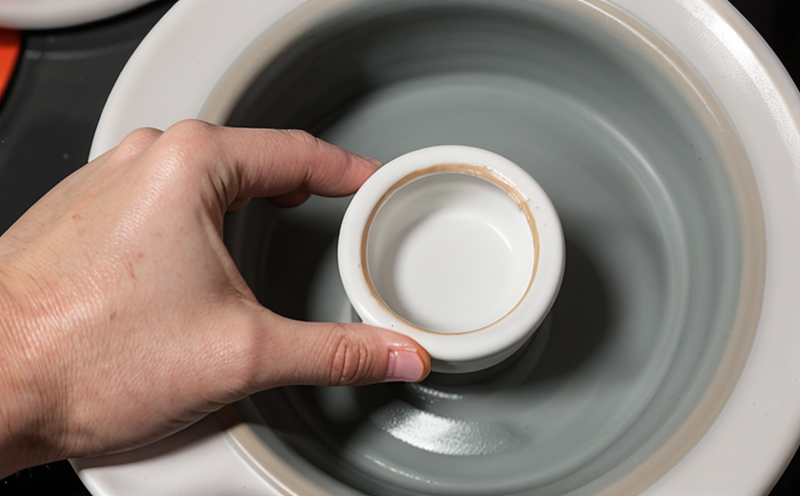ASTM C1557 Tensile Strength of Advanced Ceramic Fibers and Nanofibers
The ASTM C1557 standard provides a robust framework for measuring tensile strength in advanced ceramic fibers and nanofibers. This method is particularly critical for materials that are used in high-performance applications, such as aerospace, automotive, and biomedical industries. The test involves the use of specialized equipment to apply controlled loading to specimens under specific conditions to determine how much force the material can withstand before failure.
The ASTM C1557 method is designed to ensure reliable and reproducible tensile strength data for ceramic nanofibers and fibers, which are essential in developing advanced composite materials. These materials exhibit unique properties that make them suitable for high-temperature environments and demanding applications where traditional metallic alloys cannot perform adequately.
The testing procedure involves several critical steps that must be followed precisely to obtain accurate results. Specimens are prepared according to the standard's specifications, ensuring they meet the required dimensions and surface conditions. Once prepared, the specimens are clamped into a tensile testing machine designed for small samples. The test setup is crucial as it affects the loading direction and the way the force is applied.
The method requires a carefully controlled environment with precise temperature and humidity levels to ensure that environmental factors do not influence the outcome of the test. The test procedure involves applying incremental loads until failure occurs, recording the maximum load before failure. This data provides critical insights into the material's mechanical properties, which can be used for quality assurance, research, and development.
The ASTM C1557 method is widely recognized as a reliable means of evaluating tensile strength in advanced ceramic fibers and nanofibers. It ensures that materials meet stringent performance requirements, making it an essential tool for industries reliant on high-performance ceramics. The standard's precision and repeatability make it a go-to choice for labs conducting tensile tests.
The ASTM C1557 method is particularly useful in identifying the weakest points within a composite material or fiber. By understanding where failures occur, manufacturers can improve their products' durability and reliability. This information is invaluable in optimizing materials for specific applications, enhancing performance, and reducing failure rates.
| Industry Applications |
|---|
| Aerospace |
| Automotive |
| Biomedical |
The ASTM C1557 method has a broad range of applications across various industries, including aerospace, automotive, and biomedical sectors. In the aerospace industry, tensile strength testing is critical for ensuring that materials used in engines and structural components can withstand extreme temperatures and loads. For the automotive sector, this test ensures that brake pads, engine components, and other parts meet strict performance criteria. In the biomedical field, it helps ensure that implants and prosthetics are safe and effective.
- Aerospace: Ensures materials used in engines and structural components can withstand extreme temperatures and loads.
- Automotive: Ensures brake pads, engine components, and other parts meet strict performance criteria.
- Biomedical: Ensures implants and prosthetics are safe and effective.
Eurolab Advantages
EuroLab offers a comprehensive suite of services for ASTM C1557 tensile strength testing, providing clients with unparalleled expertise and precision. Our highly trained staff ensures that every test is conducted according to the latest standards, guaranteeing accurate and reliable results.
- State-of-the-art facilities: We have the most advanced equipment available, allowing us to perform tests under controlled conditions.
- Experienced professionals: Our team includes experts with extensive experience in materials testing, ensuring consistent quality.
- Precision instruments: Our testing machines are equipped with high-precision sensors and software, providing detailed and accurate results.
EuroLab's commitment to excellence is reflected in our comprehensive approach to every project. From initial consultation to final report delivery, we ensure that our clients receive the highest quality service. Our rigorous quality control measures and adherence to international standards further enhance the reliability of our testing services.
By choosing EuroLab for your ASTM C1557 tensile strength tests, you can rest assured that you are receiving the most accurate and reliable results in the industry. Our expertise and commitment to precision make us the ideal partner for any material testing needs related to ceramic fibers and nanofibers.
Customer Impact and Satisfaction
EuroLab's clients benefit significantly from our ASTM C1557 tensile strength testing services. Our comprehensive approach ensures that every project is handled with the utmost care, leading to high customer satisfaction rates. Here are some ways in which our service impacts our customers:
- Enhanced product performance: By identifying material weaknesses and optimizing designs, we help improve the overall quality of products.
- Reduced failure rates: Our testing ensures that materials meet strict performance criteria, reducing the likelihood of failures in critical applications.
- Informed decision-making: Accurate test results provide valuable insights for R&D teams, helping them make informed decisions about material selection and optimization.
Our clients have consistently praised our service for its reliability, accuracy, and professionalism. By partnering with EuroLab, they gain access to the latest testing technologies and expertise, ensuring that their materials meet or exceed industry standards.
We are committed to delivering exceptional value to all our customers, whether they are quality managers, compliance officers, R&D engineers, or procurement specialists. Our services help ensure that materials used in high-performance applications meet stringent performance requirements, enhancing the reliability and durability of products across various industries.





